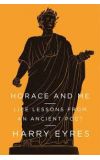
08 Jul 2013 23:33:36
Harry grew up to be a professional oenophile, an expert on cabernet sauvignon and the chronicler of Europe's wine dynasties in a series of books and columns in the Spectator and Harpers & Queen. Horry favours plonk, but doesn't refuse the grander tipples proffered by Harry. Horry stuck by Harry during some early professional ups and downs, consoled him when he suffered a "love crisis" in his 30s, and these days sagely counsels him about the "crisis of values" in our disintegrating world.
They go on regular jaunts together to Italy, where the locals greet Horry as Orazio, while Harry remains a fumbling, nerdy, untranslatable Englishman. Their homosocial inseparability seems not to bother Harry's partner, a financial journalist called Ching Ling. It helps that her rival has been dead for two millennia and can be snugly crammed into Harry's rucksack: Horry is the Latin poet Horace who, while Virgil was composing an epic about the Augustan empire, wrote a series of more intimate, jocular, conversational odes that still whisper hearty but healthily sceptical truths about life and love or happiness and tipsiness into Harry's cocked ear.
All the same, I think Ching Ling has cause for concern. Harry's book ends after his return from a pilgrimage to Horace's bathhouse in Venosa, near Naples; in bed at home in London, he listens to her breathing as she sleeps and thinks impatiently ahead to the day when that sound "will cease".
Horace and Me is a little like Withnail & I for toffs, not thesps, with the love that dare not speak its name adopting the respectable cover of a dead language. As it happens, I'm sympathetic to the motives that impelled Eyres to write his dotty hymn of praise. He rightly disparages the abstruse theorising of academics who use literary works to prosecute their grudges about colonialism or the politics of gender. For him, a great book is a boon companion, a friend to man like Keats's Grecian urn; he believes that literature is a criticism of life and potentially a guide to living well, which is why in times of personal stress he has been morally sustained by Horace as well as by his psychotherapists.
Nevertheless, it's hard to judge the claims Eyres makes for the Latin poems, because our access to them is through his own slangy translations, which brashly wrench Horace into contemporary relevance. A phrase such as "off piste" tells us how Harry spends his hols, but is coarsely unHoratian. Milton, in one of his translations, wrote about a "slender youth, bedewed with liquid odours"; in Eyres's version, the same ephebe is "drenched in Pour Homme", which is mere product placement.
It's all desperately sincere, but Eyres's emotive testimony can get mawkish. Virgil in The Aeneid spoke of "the tears in things", the sadness of mortality. Those tears too often well up in Eyres's eyes when he extols Horace: he stifles a sob, for instance, when reading one of the odes in Naples airport – though that may be because of the beer he has just drunk, or "the cuvee called Carpe Diem", named after Horace's injunction to enjoy the day, whose "enchanting rich nose of tar and leather" tickled his subtle nostrils the night before.
When not blubbing, Eyres is mostly wine-bibbing, since one of the life lessons he has absorbed from Horace has to do with the spiritual advantages of mild intoxication. Socially, however, Harry and Horry are in this department an awkward fit. Horace modestly made do with a home brew concocted from local Sabine vines; Eyres is a certified wine snob who, when paternal connections got him a job as an appraiser at Christie's, catalogued some bottles being auctioned at the behest of the needy Princess Margaret as "a medley of old bin-ends". Who after all were these jumped-up Hanoverians? Eyres himself, he informs us, is a scion of "the Catholic aristocracy".
As for the common touch, his comment on branding says it all: "To call a wine something like Eitelsbacher Karthäuserhofberg Riesling Spätlese 1976 displays a magnificent disregard for easy popularity." Excuse me while I take a swig of Blue Nun. Tellingly, Eyres transcribes a snatch of Horace "in a cafe at Paris Charles de Gaulle airport just before taking an Air France flight to Cuba". The line in question is "I hate the vulgar crowd and keep aloof"; I presume Harry was travelling at the front of the plane, on his way to a rendezvous in a Havana hotel with a flame-haired poetess who, unlike the doggily faithful Horry, didn't turn up.
Acknowledging Horace, in a religious turn of phrase, as his "secret saviour", Eyres wonders if those ancient poems might "save others, even an entire civilisation?" I'd advise him to pour himself another glass while he awaits an answer – though alcohol, come to think of it, is the way to perdition, not salvation.

